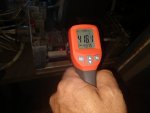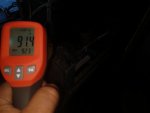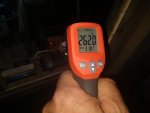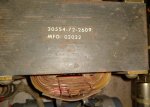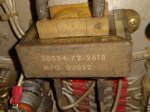OK, TM's.
LO 9-6115-464-12 is the Lubrication Order.
TM 9-6115-464-10-HR is the Hand Receipt.
TM 9-6115-464-12 is the operators Manual.
TM 9-6115-464-24P is the parts manual.
TM 9-6115-464-34 is the Second and Third level of maintenance.
The LO tells you when, where and how to service the gen set. Very good document to read and follow. Most folks ignore it. The Army spent lots of time and money getting this document right.
The -10-HR is a listing of things that should or could be belong to the gen set. In your case, a document to be ignored, as you are not going to be driving all over Gods green earth em-placing and march ordering the set.
The -12 is the operators manual. Rich in info, and more often then not ignored, sad to say. It pays to know your machine, and reading this TM, or at least skimming through will answer many, many questions. It also contains the first level of maintenance for the gen set. Along with repair procedures.
The -24P is the parts manual. It tells you much more then that, if you know how to read it.
The -34 is second and third level maintenance and repair manual. Another manual full of info, but not read very often. The military is not concerned a lot with tech info, for instance like your transformers. The part works, or it doesn't. If it works, good. If not, replace it. So lots of info civilians would expect to find in the TM, is simply not there. That's why the Army has gotten away from fixing things, to changing parts. Its faster. Less down time.
Lets talk about the -24P. Keep in mind, that there are 3 different types of 15 KW. You have the MEP-004A. That's a Utility machine. Non governing system. Run of the mill set, good for most anything. Then is the MEP-103A. It has an electrical governing system. More sophisticated. When loads change, the governor adjusts the set to keep up with the changes. Last, is the MEP-113A. This set is 99.9% the same as the MEP-103A, except, it makes 400 hertz power. Missile systems and radars, etc.
Why do you need to know this? because the different gen sets, are not all built with the same parts. So you need to know what you have, when looking in the -24P. In the front of the -24P is a listing, on page 15, (PDF reader page #). On the right side you see model numbers. The model # MEP-004A has a code listed to the left, of CLD and for gen sets with serial numbers of KZ0001 thru Z01226 code CZL. If your gen set serial number is not between these two numbers, you can forget it. This is the UOC, Usable on code. That tells you what part to order, when there is the possibility that there are several different parts that might go in the same place. If for instance you look up the NSN or part number for the Main generator, you will see there are two different numbers. Or the frequency transducer. One is for 60 hertz sets. One is for 400 hertz sets. So if you look at a picture, and want to find a part, and it is listed with a UOC, then you need to stop and pay attention. Or you might order a 400 hertz part, instead of a 60 hertz part. The UOC, CLD is the number you need to remember.
Here is the first test. Look up the T1 in the static exciter. I think its item #29. What is the NSN and part number?
Now, on your pictures of transformers there was part numbers. T1 had the # 30554-72-2609 stamped on it. It is, and isn't, the part number. The first part, 30554 is called Manufactures Code, (MFR code, also known as a CAGE). Every company that supplies parts the the militarily, has a CAGE code. But that's a misnomer. Its may not be the manufacture, it my just be the Supplier. In this case, 30554 is the code for MEP, (Mobile Electric Power) a government organization. When you want to know who supplied the part, google CAGE code ***** and it will come up. Sometimes that the manufacturer, and sometimes just the supplier.
The second part, 72-2609 is the part number used by the supplier. If you looked close, you saw that the T1 has TWO part numbers, and two suppliers. In fact, there are about 10 suppliers and 10 different part numbers. Often, when you type in one number to search for, you get leads to other part numbers also.
When searching, never forget to also search for the NSN, (National Stock Number). This number is for the part meant to go in the set. There is only one NSN for 99.99% of the parts in the supply system, but there can be 10-20 part numbers. I always look for the NSN first, then the part number.
I could go on and on. But I am sure you don't want to hear it all.



